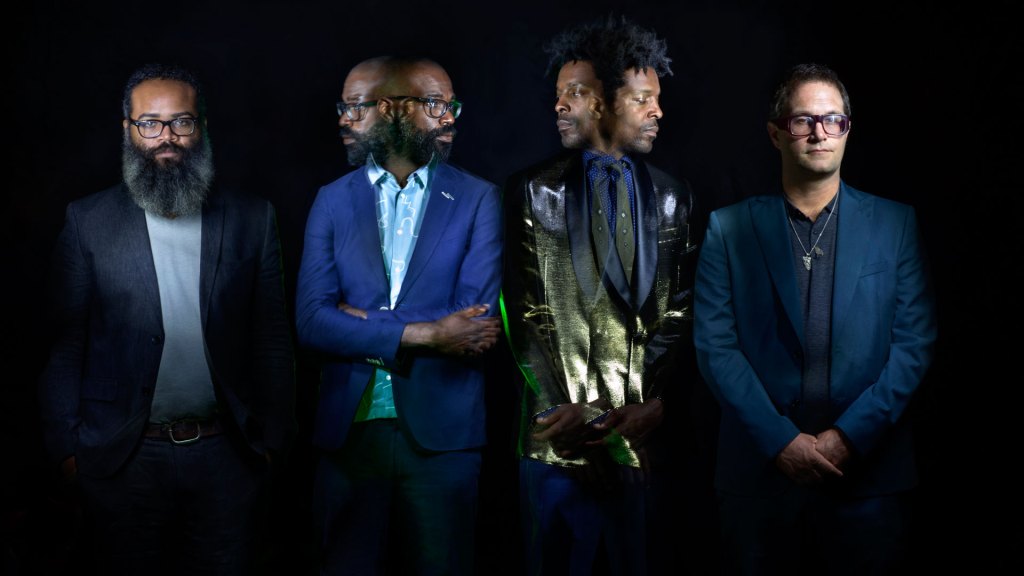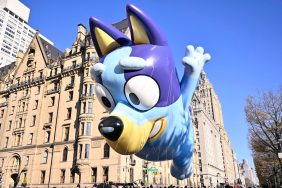On April 20, 2011, Gerard Smith lost a lengthy battle with lung cancer. This well could have spelled out the end for TV on the Radio, the band for which he had played bass and keyboards for since 2005. It was a devastating and untimely loss, one that resonated throughout the indie-rock realm and one that, for a moment, left his surviving bandmates at a loss.
Even when touring in support of their final album with Smith, Nine Types of Light, it felt as though it was a matter of obligation. Who knew what lay beyond? Four years on, the band released Seeds.
It’s a record of new beginnings, of loss, of love and the idea of love. It’s a TV on the Radio album in the face of the notion there may well have never been another TV on the Radio album. As such, it’s a beautiful and at times challenging record, one that’s indicative of life still buzzing through the band’s core.
In June, TV on the Radio will return to Australia as a part of Vivid LIVE, playing two nights at the iconic Sydney Opera House concert hall. Headlining dates in Melbourne and Brisbane are also on the cards; in which the band will showcase Seeds as well as a slew of other tracks from their other four albums.
Ahead of the tour, we spoke with lead vocalist Tunde Adebimpe about love songs, live shows and losing a friend.
Listen: TV on the Radio – Careful You

Music Feeds: Apart from a one-off show at Splendour, you guys haven’t properly been back to Australia since the 2011 Harvest Festival. It was around that point that you guys were touring as a six-piece for the first time – Jaleel had moved to bass, Japhet Landis had joined on drums and Dave Smith was on trombone.
It was a very new prospect then, but by the time you guys get back to Australia for Vivid it will be a well-established set-up. Do you feel you’ve substantially developed this line-up of the band in the years that have followed Nine Types of Light?
Tunde Adebimpe: I was just talking to someone about this the other day. It shouldn’t be surprising, considering we’ve been playing with this line-up for so long, but it’s so much fun now. I feel like we’re finally a very good live band, which sounds strange coming from my mouth, but it’s the truth. We’re so in sync with what the band is, it’s almost an unconscious and uplifting activity, almost automatic. Everyone’s really locked in. We use the word Voltron a lot, we feel like him!
MF: A lot of TV on the Radio songs are known to change quite a bit from their studio versions when played live – songs like Young Liars, Satellite, Staring at the Sun and, of course, Wolf Like Me, are all examples of this. Have you noticed anything similar since you began playing songs from Seeds live?
TA: We actually haven’t! I think the songs that we’re playing from this record are perhaps the closest we’ve done to recordings for any album. We just kind of figured out… not so much tricks, but we figured out how to do it. The songs are not necessarily simplified, but there’s a lot more space on this record. It’s a lot easier to translate live.
Changing the songs, in a lot of instances, was out of necessity. Ten years ago, we couldn’t have brought out an organ on the road or all the things we used on the show. That’s kind of how a lot of songs turned more into basement punk songs when we played them live. I still love that energy, but it didn’t really apply to what we were doing with Seeds.
Watch: TV on the Radio – Lazerray

MF: One thing that has been interesting to note throughout the discography of TV on the Radio is the progression of the love song. You guys have dealt with intimacy, romance and relationships through songs like Ambulance and Wear You Out early on, which are quite graphically blunt and use extensive metaphor.
Later on, there are songs like Will Do from the last record and Careful You from Seeds which are both far more straightforward in their approach to the subject matter. Has it more or less been a matter of personal maturation that relates back to how you write about things of this nature?
TA: I think so, in part. It’s funny, I was doing another interview where someone asked about Seeds and said “Well, there’s a lot of love songs on here.” It made me think – have you heard top 40 radio? I mean, that’s not really our world; but I feel like pop music is a reassurance agency.
Everyone is talking about love or love lost. It’s desire. At least, it’s some sort of desire – it could be taking a girl home or making a lot of money. It comes down to desire. You’ll struggle to think of songs that aren’t directly about love in that sense when you look at the bigger picture.
I also think that if you’re talking about things like relationships and human interaction, there’s never one story. It’s really intricate. You can always explore. I think, in any given relationship, you’ve got primary feelings of affection that you later realise is just infatuation. You can call it a lie, or just call it something you were blindsided by.
If you get beyond that, you’re stuck with the reality of being with another person. Growing with another person. Accepting another person. Everyone’s coming from a different place. The way you choose to deal with that is another aspect of it. I feel like there’s romantic love, familial love, fraternal and platonic love. You approach everything differently.
Watch: TV on the Radio – Will Do

MF: That’s something that’s directly tackled on Quartz, which is the opening song from the album. Its first lyric is “How much do I love you? / How hard must we try? / To set into motion / A love divine?”
TA: The thing about all of these songs is that once we’ve finished writing them, they’re out of our hands. They’re out in a world of interpretation, and there’s no wrong way to hear that. Quartz isn’t so much about a person… I mean, it could be.
One thing that I remember about this song when it first showed up, I felt that it was more about a relationship or an affection for something larger than yourself. The magnificent and the microscopic part of life. The idea that we’re all here and that I can talk to you and you can understand me, I can pick things up with hands that I control with my brain. There’s a lot of mystery in there. The song is calling out to that.
MF: We were introduced to the album with the song Happy Idiot, which features one of the more curious metaphors the band has ever enlisted: “I’m a happy idiot / Waving at cars.” Is it to be interpreted directly, or is it just a case of having no idea how to deal with the weight of something within one’s immediate reality?
TA: It’s a sense of being so taken aback or blindsided by something, a relationship, a situation at hand, that you’re trying to distract yourself or go into a state of denial. Think of the “waving at cars” not happening from afar – think of it as happening as the person is in the middle of the road, and the traffic is coming directly toward them. It’s the notion of treating yourself badly, putting yourself in harm’s way, because your thoughts somehow feel worse than any physical pain you may encounter.
Watch: TV on the Radio – Happy Idiot

MF: As is well-documented, Seeds is the first TV on the Radio album since we lost Gerard Smith. He was enigmatic and reserved as a performer, but he was also such an exceptional talent. People always remembered Gerard in the best way.
Obviously the personal loss is immeasurable, but what of when it came to writing as a four-piece for the first time? Was it difficult to relegate roles and positions in order to rebuild and continue as TV on the Radio?
TA: I’m not sure. The method of making the songs has always happened in so many different ways. People get so many different aspects to work with within the band, and that’s always changing. When I think about Gerard… how do you put it into words? He had this sort of quality control. He had a pretty good method, he and Dave [Andrew Sitek, guitarist/producer] could hear something and call bullshit or note an excess.
He was such a precision-oriented person and a brilliant musician. It’s one of those things where you think of someone even more when they’re not there. When someone impacts your life like that, they’re basically on the board of creative directors. I always wonder what he would make of the things that I do. Gerard and maybe two other people in my life have had that impact.
I have to push myself further for him and for them, because I know that he’d call me out on it if I didn’t. I’d say that’s impacted on what we’ve done on this record in a lot of ways.
MF: With five records, there’s obviously a lot to work with in the canon of TV on the Radio when it comes to live shows. Even with the inclination towards material from Seeds being a given, how does the band approach setlist writing now?
TA: We’re not short on songs, that’s for sure. That was a really weird thing to realise. We were rehearsing for the tour, writing down more or less every song that we’ve played and wanted to keep playing. Even after some cuts of songs we didn’t feel like playing anymore, we were still looking at somewhere between 60 and 70 songs.
The setlists rotate, and the further we get into the tour we start finding these other little gems that we haven’t played in a long time. It’s a lot of fun to go through the rolodex, so to speak, to see what we can find on any given night.
–
TV on the Radio hit Australian shores in early June. Grab the tour details below.
Watch: TV On The Radio – Trouble
Tour Dates
Monday, 8th June
Sydney Opera House, Sydney
Tickets: Vivid LIVE
Tuesday, 9th June
Sydney Opera House, Sydney
Tickets: Vivid LIVE
Wednesday, 10th June
The Tivoli, Brisbane
Tickets: Live Nation
Friday, 12th June
The Forum, Melbourne
Tickets: Live Nation
Saturday, 13th June – NEW SHOW
The Forum, Melbourne
Tickets: Live Nation













